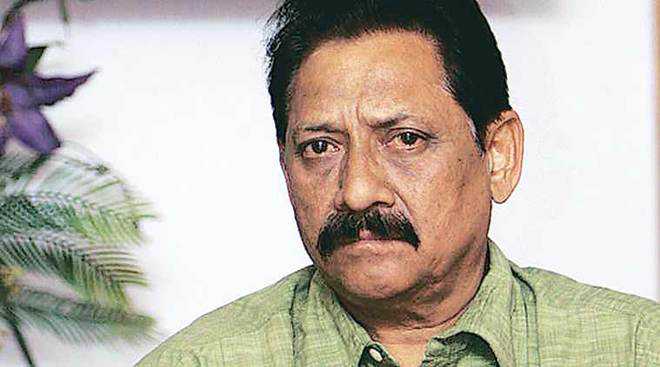Chetan Chauhan, the former India batsman and veteran cricket administrator, has died at the age of 73.
Former Test batsman Chetan Chauhan, who shone as a gritty player against pace overseas and as Sunil Gavaskar’s enduring opening partner in the 1970s, died on Sunday following complications due to Covid-19. He was 73 and is survived by wife Sangeeta and son Vinayak.
The two-time former Lok Sabha MP was Home Guard minister in Uttar Pradesh’s Yogi Adityanath’s cabinet, having served as the state’s sports minister. The BJP leader tested positive for Covid-19 last month and was shifted to a Gurugram hospital after his condition worsened.
“My elder brother Shri Chetan Chauhan has left us today after fighting a good battle. I sincerely thank everyone who had prayed for his recovery. His son Vinayak will be reaching anytime and we will then perform last rites,” brother Pushpendra told PTI.
In a decade-long Test career, Chauhan played 40 Tests and seven ODIs. He scored 2,084 Test runs with 16 half-centuries but missed out on a century with a best of 97. He played few ODIs, but was a prolific batsman in his long first-class career.
Chauhan represented Maharashtra for almost a decade before switching to Delhi, amassing 11,143 runs, with 21 centuries and 59 half-centuries. The last of those innings was a gritty half-century with a broken finger, in the 1985 Ranji Trophy final loss to Mumbai.
Shri Chetan Chauhan Ji distinguished himself as a wonderful cricketer and later as a diligent political leader. He made effective contributions to public service and strengthening the BJP in UP. Anguished by his passing away. Condolences to his family and supporters. Om Shanti.
— Narendra Modi (@narendramodi) August 16, 2020
Born in UP’s Bareilly, Chauhan grew up in Pune where his father, who was in the army, was posted. Thus he took early steps in Pune cricket and went on to play for Maharashtra.
He made his Test debut in 1969, but was discarded after playing only five Tests. He made a strong comeback, playing 35 Tests between 1977 and 1981, 17 of them away from home, before his international career ended.
Chauhan cemented his place in Indian cricket on his recall to the Test team in 1977 after a prolific domestic season that included a 158 against Haryana for Delhi braving a fractured jaw.
He shared 11 Test century stands with Gavaskar, 10 of them for the opening wicket. He didn’t possess an orthodox batting technique, but could grind out attacks and complement his great batting partner.
Chauhan’s significant batting efforts came in Australia. He hit 88 at bouncy Perth on the 1977 tour, against an attack led by Jeff Thomson. On the 1980-81 tour, he played an important role as India fought back to draw 1-1 with a famous win in the final Test at Melbourne.
His career ended without a Test century, dismissed on 97 in the drawn second Test at Adelaide, having tackled the formidable trio of Dennis Lillee, Rodney Hogg and Len Pascoe.
At MCG, he seemed set for a maiden century when a 165-run opening stand ended after Gavaskar (70) was controversially given out leg before to Lillee. Upset by the sledging that followed, skipper Gavaskar asked Chauhan to walk out with him. The team manager persuaded Chauhan to return, but he lost focus and was out for 85, the wicket falling 11 runs after Gavaskar’s dismissal. India though sealed a famous win, routing Australia for 83 chasing a fourth-innings target of 143.
Chauhan was involved in another famous opening stand in the 1979 Test at the Oval. He scored 80 in a 213-run stand with Gavaskar, who went on to score his then career-best 221. India finished agonisingly nine runs short of the winning target, reaching 429/8, when the Test ended as a draw.
Chauhan was chairman of the National Institute of Fashion Technology (NIFT) for a year from June 2016, having served two terms in the Lok Sabha, elected from Amroha in 1991 and 1998.
Given the Arjuna award in 1981, he was a long-time office-bearer of the Delhi and District Cricket Association. His most significant contribution as a cricket official came as manager on the controversial 2008 tour of Australia, when an initial ban on Harbhajan Singh for alleged racist remarks to Andrew Symonds in the Sydney Test almost led to an India boycott of the series.
The tour continued after India’s appeal was upheld by the ICC adjudicator, who turned the ban to heavy fine for use of abusive language. India went on to win the Perth Test.













![Hotstar Premium Cookies 2019 [*100% Working & Daily Updated*] Hotstar Premium Cookies 2019 [*100% Working & Daily Updated*]](https://tahav.com/wp-content/uploads/2019/11/Hotstar-Premium-Cookies-Free-100x70.jpg)



